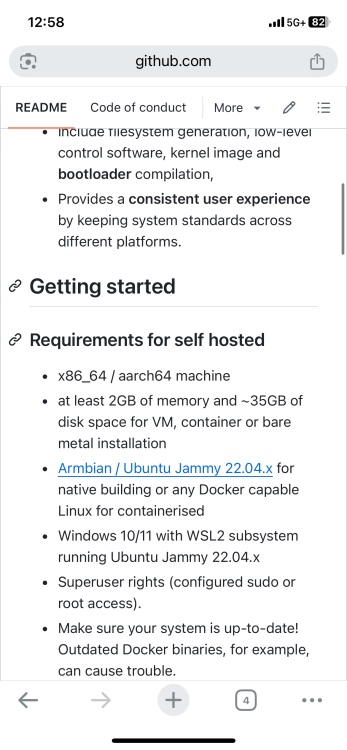All Activity
- Past hour
-
Greetings; I have downloaded this https://dl.armbian.com/cubox-i/Noble_current_server and verified that I got what I was supposed to (ASC, SHA). I have used a brand new usbimager to install it on various freshly formatted (brand new SD Formatter) and verified working Samsung Evo 32GB, SanDisk Extreme Plus 16GB, Extreme Plus 32GB. All the formatting, imaging and installation done on an Ubuntu 25.04 laptop. After usbimager is done, if I use the Ubuntu Disks application to look at the drive, the first partion shows as free space, which seems suspicious. When I insert the newly-set up SD cards in the Cubox-i4, I see the bootloader start and then do its handoff to the operating system... and then nothing. No more signal on the HDMI cable, nothing out on ssh, nothing. The Cubox-i4 tries to reboot every few minutes with no more successful outcome. This same Cubox-i4 runs fine with the last SD card system disk I built for it using the previous Debian server image. Does anyone have any ideas? Thanks in advance!
- Today
-
Thank you @Igor. I downloaded and confirmed sha on Armbian_25.8.1_Tritium-h5_trixie_current_6.12.35_minimal.img.xz. I confirmed my card with F3 and used the SD Format tool to format my uSD card. I wrote the image to my uSD card. $ sudo unxz -c Armbian_25.8.1_Tritium-h5_trixie_current_6.12.35_minimal.img.xz | dd of=/dev/sde bs=1M oflag=direct conv=fsync status=progress iflag=fullblock I then mounted the newly written uSD card and changed the verbosity to 7 in /boot/armbianEnv.txt and added my .not_logged_in_yet and .rootfs_resize to the /root directory of the uSD card. First boot started out well, but 30 seconds in, it hung. I pulled the power after 30 minutes. Here's the log from my serial console: After pulling the plug and re-plugging it in, Armbian booted, but it took a long time. I know the board is not fast, but I went to lunch and came back to finally see the auto log in root prompt. I ran armbian-upgrade and rebooted. This time it was much faster to get to the log in prompt. I'd say this is solved with the new Armbian image, but the hang up at 30 seconds and pulling of power is not ideal. I'm not sure what else I can give you to debug that.
-
I don't know much, I enabled it as a test, but I like the overview, as I have my favorites easily run as soon as I log into gnome. Maybe we could do: download it to /usr/share/gnome-shell/extensions/ and then run gnome-extensions enable no-overview@fthx. Here's a draft script that may be useful for the ones that want that: git clone --depth=1 https://github.com/fthx/no-overview.git NO_OVERVIEW=$(jq -r .uuid no-overview/metadata.json) mkdir -p /usr/share/gnome-shell/$NO_OVERVIEW gnome-extensions enable $NO_OVERVIEW Does that help?
-
@Piotr syou can try this build it’s based on the 6.14 kernel. Only issue I know of is audio using the a/v port. https://github.com/NickAlilovic/build/tree/v20250407
-
Hello everybody, I tried building an in-kernel module for USB Dongle Bus 001 Device 003: ID 2357:0120 TP-Link Archer T2U PLUS [RTL8821AU] on my OrangePi Plus. Armbian supplied module from aircrack-ng/rtl8812au has become aging and raises exception errors on modprobe -r. It was deactivated : root@orangepiplus:/etc/modprobe.d# vi blacklist-88XXau.conf #blacklist 88XXau I made a fresh install of Armbian minimal image, then switched to : root@orangepiplus:~# uname -a Linux orangepiplus 6.15.4-edge-sunxi #1 SMP Fri Jun 27 10:13:43 UTC 2025 armv7l GNU/Linux root@orangepiplus:/usr/src# cat /proc/version Linux version 6.15.4-edge-sunxi (build@armbian) (arm-linux-gnueabihf-gcc (Ubuntu 13.3.0-6ubuntu2~24.04) 13.3.0, GNU ld (GNU Binutils for Ubuntu) 2.42) #1 SMP Fri Jun 27 10:13:43 UTC 2025 root@orangepiplus:/usr/src# zcat /proc/config.gz | grep CC_VERSION CONFIG_CC_VERSION_TEXT="arm-linux-gnueabihf-gcc (Ubuntu 13.3.0-6ubuntu2~24.04) 13.3.0" CONFIG_GCC_VERSION=130300 root@orangepiplus:/usr/src# zcat /proc/config.gz | grep STACKPROTECTOR CONFIG_CC_HAVE_STACKPROTECTOR_TLS=y CONFIG_STACKPROTECTOR_PER_TASK=y CONFIG_HAVE_STACKPROTECTOR=y CONFIG_STACKPROTECTOR=y CONFIG_STACKPROTECTOR_STRONG=y Headers were downloaded with armbian-config : root@orangepiplus:/mnt/sda2/src/linux-6.15.4# drwxr-xr-x 25 root root 4096 Aug 21 21:40 linux-headers-6.15.4-edge-sunxi Then performed usual build process: root@orangepiplus:/usr/src# sudo git clone --depth 1 --branch linux-6.15.y https://git.kernel.org/pub/scm/linux/kernel/git/stable/linux.git root@orangepiplus:/usr/src# sudo ln -s /usr/src/linux /lib/modules/$(uname -r)/build root@orangepiplus:/usr/src# ls -al /lib/modules/$(uname -r)/build lrwxrwxrwx 1 root root 14 Aug 21 22:45 /lib/modules/6.15.4-edge-sunxi/build -> /usr/src/linux cp /boot/config-$(uname -r) /usr/src/linux/.config sudo make olddefconfig sudo make menuconfig Module activated in the following tree : │ Symbol: RTW88 [=m] │ │ Type : tristate │ │ Defined at drivers/net/wireless/realtek/rtw88/Kconfig:2 │ │ Prompt: Realtek 802.11ac wireless chips support │ │ Depends on: NETDEVICES [=y] && WLAN [=y] && WLAN_VENDOR_REALTEK [=y] && MAC80211 [=m] │ │ Location: │ │ -> Device Drivers │ │ -> Network device support (NETDEVICES [=y]) │ │ -> Wireless LAN (WLAN [=y]) │ │ -> Realtek devices (WLAN_VENDOR_REALTEK [=y]) │ │ (1) -> Realtek 802.11ac wireless chips support (RTW88 [=m]) root@orangepiplus:/usr/src/linux# grep -E 'CONFIG_RTW88_CORE|CONFIG_RTLWIFI|CONFIG_RTW88_8821AU' .config CONFIG_RTLWIFI=m CONFIG_RTLWIFI_USB=m # CONFIG_RTLWIFI_DEBUG is not set CONFIG_RTW88_CORE=m CONFIG_RTW88_8821AU=m cp /usr/src/linux-headers-6.15.4-edge-sunxi/Module.symvers /usr/src/linux/ Then compiled with: root@orangepiplus:/usr/src/linux# sudo make -j$(nproc) ARCH=arm CROSS_COMPILE=arm-linux-gnueabihf- M=drivers/net/wireless/realtek/rtw88 make[1]: Entering directory '/usr/src/linux/drivers/net/wireless/realtek/rtw88' MODPOST Module.symvers CC [M] rtw88_core.mod.o CC [M] .module-common.o CC [M] rtw88_8822b.mod.o CC [M] rtw88_8822bs.mod.o CC [M] rtw88_8822bu.mod.o CC [M] rtw88_8822c.mod.o CC [M] rtw88_8822cs.mod.o ... LD [M] rtw88_core.ko LD [M] rtw88_8822b.ko LD [M] rtw88_8822bs.ko LD [M] rtw88_8822bu.ko LD [M] rtw88_8822c.ko LD [M] rtw88_8822cs.ko LD [M] rtw88_8822cu.ko LD [M] rtw88_8723x.ko LD [M] rtw88_8723d.ko LD [M] rtw88_8723ds.ko LD [M] rtw88_8723du.ko LD [M] rtw88_8821c.ko LD [M] rtw88_8821cs.ko LD [M] rtw88_8821cu.ko LD [M] rtw88_88xxa.ko LD [M] rtw88_8821a.ko LD [M] rtw88_8821au.ko LD [M] rtw88_sdio.ko LD [M] rtw88_usb.ko make[1]: Leaving directory '/usr/src/linux/drivers/net/wireless/realtek/rtw88' root@orangepiplus:/usr/src/linux# modinfo /usr/src/linux/drivers/net/wireless/realtek/rtw88/rtw88_8821au.ko filename: /usr/src/linux/drivers/net/wireless/realtek/rtw88/rtw88_8821au.ko license: Dual BSD/GPL description: Realtek 802.11ac wireless 8821au/8811au driver author: Bitterblue Smith <rtl8821cerfe2@gmail.com> ... alias: usb:v0BDAp0811d*dc*dsc*dp*icFFiscFFipFFin* depends: rtw88_usb,rtw88_8821a name: rtw88_8821au vermagic: 6.15.11 SMP mod_unload ARMv7 thumb2 p2v8 sudo make modules_install ARCH=arm CROSS_COMPILE=arm-linux-gnueabihf- doesn't work. Needs fixing. So I just copied modules to system location : root@orangepiplus:/usr/src/linux# sudo cp /usr/src/linux/drivers/net/wireless/realtek/rtw88/*.ko /lib/modules/$(uname -r)/kernel/drivers/net/wireless/realtek/rtw88/ root@orangepiplus:/usr/src/linux# sudo depmod -a But loading failed as follows : root@orangepiplus:/usr/src/linux# sudo modprobe rtw88_8821au modprobe: ERROR: could not insert 'rtw88_8821au': Exec format error Aug 22 16:31:52 orangepiplus kernel: module rtw88_88xxa: .gnu.linkonce.this_module section size must match the kernel's built struct module size at run time It appears to be a structural issue, as I also tried building out-of-kernel module from lwfinger/rtw88 I also tried building on Nanopi-r5s. Each time Exec format error was observed despite the module was successfully built. Different analysis point to GCC version mismatch between kernel and build host, ABI incompatibility and subtle build failures, thus causing non-alignment with the kernel buid. Several other build flags were tried to align with the kernel, but in vain. The root cause was not found. I am running out of options now. Could community or development team point to correct approach building an in-kernel module on a running system in native environment ? PS : complementary information : when armbian headers were downloaded with armbian-config, the following build output was observed : /usr/lib/gcc/arm-linux-gnueabihf/12/cc1 -quiet -I ./scripts/include -I ./scripts/dtc/libfdt -imultilib . -imultiarch arm-linux-gnueabihf -D _LARGEFILE_SOURCE -D _FILE_OFFSET_BITS=64 -D NO_YAML -MMD scripts/dtc/.dtc.o.d scripts/dtc/dtc.c -quiet -dumpdir scripts/dtc/ -dumpbase dtc.c -dumpbase-ext .c -mfloat-abi=hard -mtls-dialect=gnu -mthumb -mlibarch=armv7-a+fp -march=armv7-a+fp -O2 -Wall -Wmissing-prototypes -Wstrict-prototypes -std=gnu11 -fomit-frame-pointer -o /tmp/ccY6Z3QK.s It may give some clues on the flags used.
-
@ARx8if need help fixing the sd card. Login to IRC and ask the sunxi guys. https://oftc.catirclogs.org/linux-sunxi/2025-08-20
-
@Trung Nguyễn git clone https://github.com/NickAlilovic/build.git --branch v20250306 cd build ./compile.sh choose "Do not change kernel configuration" choose "Show CSC/WIP/EOS/TVB" choose "I understand and agree" choose "x98h" choose "edge" rest is up to you. Your image should be in output/images directory.
-
Well no. I meant what you did. Install on an SD card and boot. The thing is the RoobiOS menu, as far as I understand, is the EMMC Radaxa OS U-boot. My EMMC was shipped empty, and I have no Roobi Menu. U-Boot is the first thing to load, so if you get a Roobi menu you are not booting from SD card u-boot.
-
@prahal ok - so I've only been using the micro SD card to try boot and load an image from. So far, from what I understand, RoobiOS seems to be installed on the onboard emmc at a lower-priority boot option (i.e. if there's no boot OS on the NVMe, microSD or SATA III drive then boot from the onboard emmc). If I understand correctly, you're suggesting I load an empty / non-bootable micro SD card and then from the RoobiOS menu select one of your builds, chose to install to the micro SD and then transfer the bootable image to NVMe after? (Not that I know how to transfer the OS from micro SD to NVMe ... yet ... but, as I say ... more learning ) . If this is correct then happy to try that.
-
Outdated kernel. overlays were probably added later https://github.com/armbian/linux-rockchip/tree/rk-6.1-rkr5.1/arch/arm64/boot/dts/rockchip/overlay
-
I have no experience installing to NVME yet, but I guess you have to write the image to an SD card then move the install with armbian-config to the NVME. Also I don't know if Radxa u-boot is OK for Armbian images. You might be booting from Radxa U-boot on emmc to Armbian Linux kernel. I hope if an Armbian install SD card is inserted, its u-boot takes precedence over the EMMc one, but I am not confident it does for an NVME install. I cannot test a RoobiOS setup until mid September to confirm if that is the issue. You should provide the serial console output so I can investigate.
-
Debug boot issues: https://debug.armbian.de
-
Preach You're 100% right - people do what they can - and we (I think that I think for most people) just appreciate what others can do that we can't For now I have what seems to be a CLI build ... I'm a Windows guy so learning about Linux. I did try dabbling 27 years ago ... but what was new then hasn't been cemented into my mind. Although interesting to see that KDE and GNOME are still a thing! But the principles make sense and much of the OS architecture is actually very similar... although the command line can be very different! For now I'm just trying to get OMV running so fingers crossed.
-
@mihanson Try new builds from incoming folder https://fi.mirror.armbian.de/incoming/igorpecovnik/tritium-h5/archive/
-
The code I am trying to run modifies the framebuffer /dev/fb0, I seen that the code works properly on Linux 5.15 on a Raspberry Pi, but not on 6.x. I tried on Armbian with Linux 6.x but I got also a bad behavior that is why I wanted to test the old kernel. About real-time, it is because I need that the process executions are not interrupted by the kernel. Probably, it may be better for me to understand why the code doesn't work on 6.x.
-
I have deployed Debian Trixie from download pages - with success. Moved my HA instance on it without any troubles.
-
Try the following: Armbian_25.8.1_Nanopi-r3s-lts_bookworm_current_6.12.41_minimal.img https://dl.armbian.com/nanopi-r3s-lts/Bookworm_current_minimal
-
OK. So solution is to properly writing SD. Armbian_25.5.2_Nanopi-r3s-lts_bookworm_current_6.12.34_minimal and the same result Armbian_25.5.2_Nanopi-r3s-lts_noble_current_6.12.34.
-
Yes. I also used gnome-disks and didn't bother to decompress, as it is not required to do so. Which img are you writing exactly?
-
Yes I tried. With no result. I even tried to write (decompressed) image by "gnome disks" graphic tool on Debian. With no result also. Board behaves like no system on SD (blink red led and no activity led on ethernets, except one on WAN). So the question is: if to insert properly recorded Armbian SD to x86 Debian, system have to recognize partition and read content of it, right?







